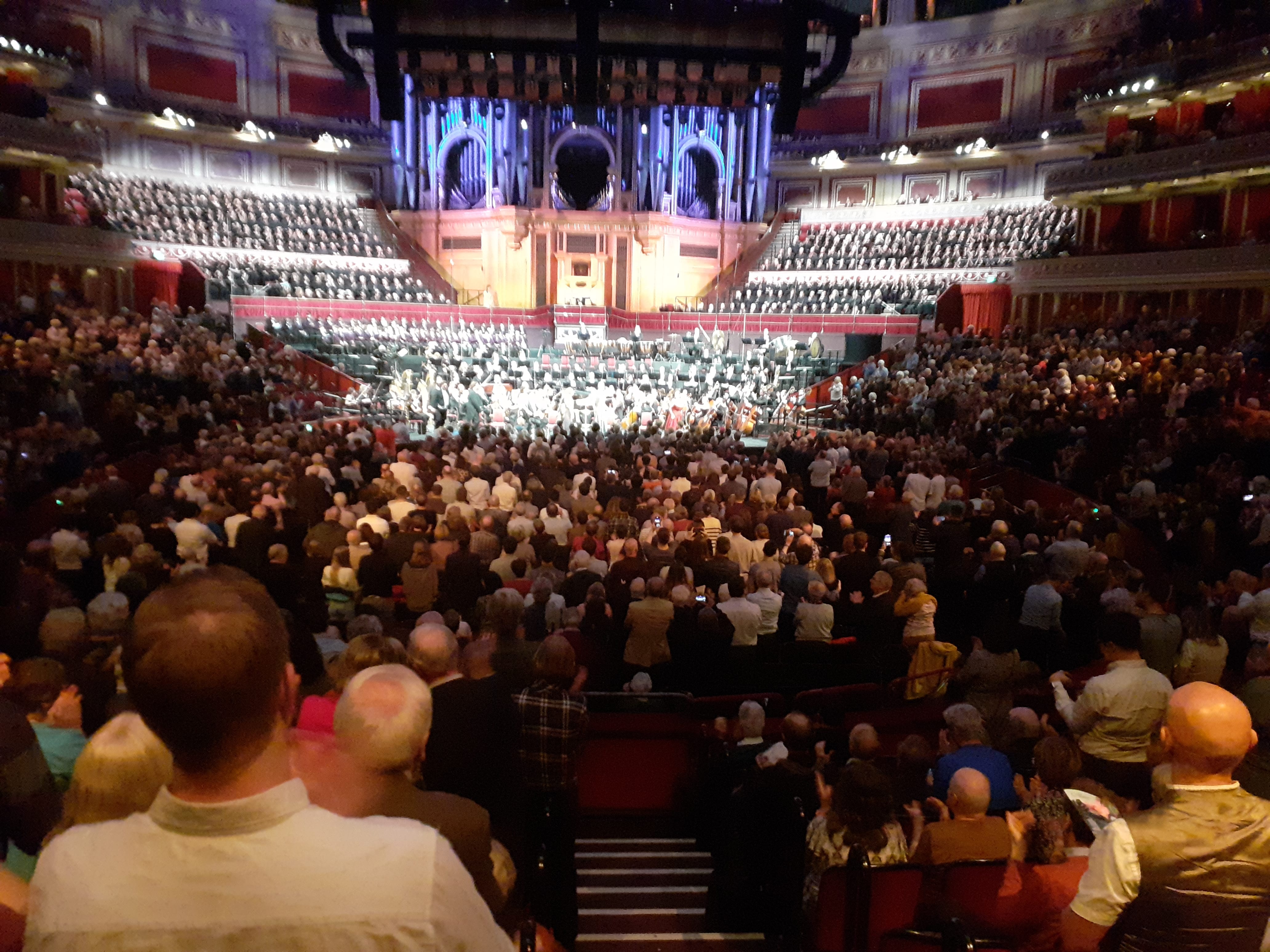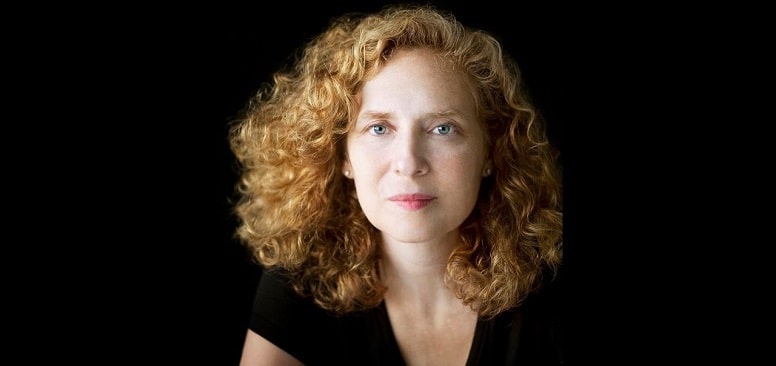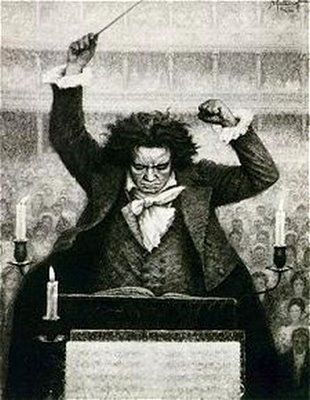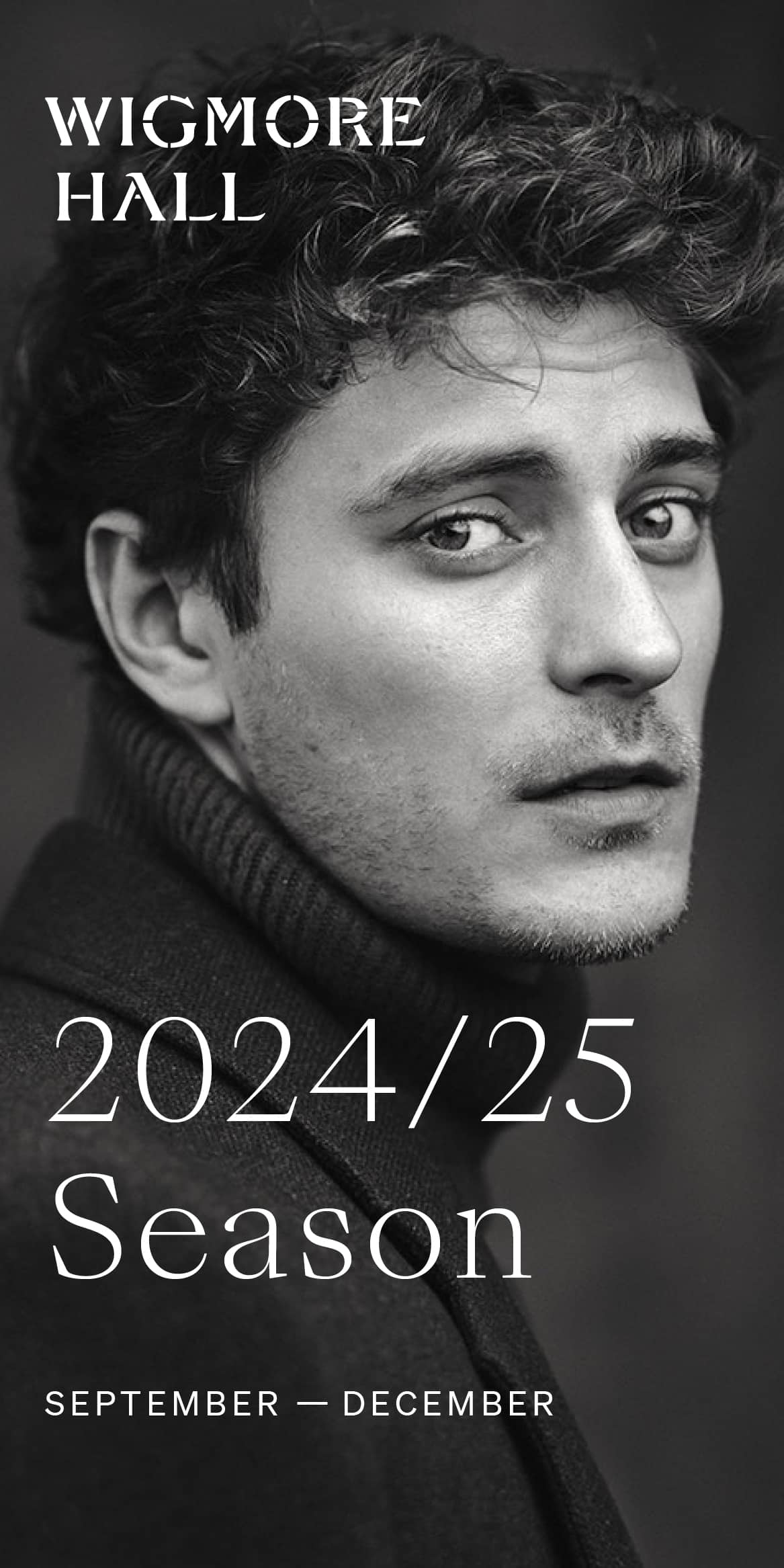First review: This was a Mahler Eighth and a half
NewsWhen Gustav Mahler was writing his eighth symphony, over six weeks in the summer of 1906, he expressed doubts that there was a hall large enough in the world to contain it. The symphony requires a huge orchestra, eight vocal soloists, three adult choruses, two boys choirs – and that’s a minimum. The impresario who staged its first performance in Munich in 1910 used a temporary structure with 3,000 seats and dubbed the work The Symphony of A Thousand for the vast array of performing manpower required, not to mention women and children.
A fully convincing performance is hard to obtain. The first half of the work, a Pentecostal hymn, is joined to the second – an extract from Goethe’s Faust – by a contemplative instrumental passage that seems out of place between the two continental shelves (it would later spark the Sea Interludes in Benjamin Britten’s Peter Grimes). Mahler described himself as being inspired throughout the process of composing, lacking objective distance. It was the only time he failed to revise a score. Difficulties abound. I have seen some very distinguished maestros produce 90-minute meanderings that are no more than the sum of random parts.
This afteroon’s performance at the Royal Albert Hall was not one of those occasions. The hall, opened in 1871, is practically purpose-built for Mahler’s Eighth. Equipped with a thunderous organ and outlying balconies on which to place offstage instruments, it embraces the opening roar of Veni, Creator spritus (come, creative spirit) with expansive ease. Bring it on, says the hall, and that’s just what Vasily Petrenko and the Royal Philharmonic did, before a house that was packed, rapt and ecstatic. Almost as if Covid never happened.
Peterenko is a man revitalised after a long stint with the Royal Liverpool Philharminic. He is now leading a London orchestra that seems to spend most of its time abroad. Only the RPO could afford to stage Mahler Eighth in present financial uncertainties. The opening blast literally lifted people out of their seats. The visceral force of Veni is utterly irresistible.
The orchestra continued to alternate ear-busting volume and filigree solos, most memorably from leader Duncan Riddell and principal flute Emer McDonough. The percussion at one point threatened unilateral independence. The two boys choirs deserve to be let off games for a week (I shall write to their headmasters). Of the vocal soloists, Sarah Wegener and Regula Mühlemann crested surging waves sound like seagulls in an Atlantic tornado. Sopranos are not designed to overcome hundreds of voices; these heroines did.
Of the half-dozen Mahler Eighths I have heard in concert, Tennstedt, Solti and Chailly stand out. Today’s was a performance in that elevated class, maybe even a bit more. A Mahler Eighth and a half. Otto e mezzo, as Fellini would have said.






Cried quite a bit, it was one of the best moments of my life. Thank all of you people over there today
“I have some problems with [Mahler’s] symphonies […] Sometimes for ten minutes of paradise, you have twenty minutes of—well, something else, I don’t know what. […] there are always so many young conductors who do Mahler because the loud finales will always get you lots of applause.” (Riccardo Muti)
I’m not sure what LH is hinting at, but his quote should be read in its context, an article from 2015, by Dennis Polkow, in which Muti talks about his developing interest in Mahler: https://music.newcity.com/2015/09/15/offbeat-muti-makes-a-gift-of-mahler-to-the-entire-city/
““Other than Mahler One and Four, which are shorter, I have some problems with the symphonies,” Muti confessed ***at the time***. “Sometimes for ten minutes of paradise, you have twenty minutes of—well, something else, I don’t know what. With Bruckner, I find a world that speaks to me, but with Mahler, you must ‘feel’ him to do him. If not, no loss, …”
***i.e. five years earlier, In 2010-11, the centenary year of Mahler’s death, when Muti “chose to reconstruct the final concert that Mahler ever conducted … it happened to be a program of Italian composers who were contemporaries of Mahler. … it did end up being a fascinating program; but of course, it did beg the question of why Muti was not performing any of Mahler’s own music.”***
In 2014/15 he says interestingly “What is clear to me now is that Mahler is an operatic conductor, he is not Bruckner. He is somebody who spent most of his time in the pit of an opera house. And you can feel that in the music, particularly in terms of its tension and release.”
And the final quote in the article is “… perhaps at the end of my life, I may show up as a Mahler conductor! … It’s possible I have finally developed the personality for Mahler. Maybe I have waited so long to come closer to this composer.”
“Almost as if Covid never happened.”
But it still is happening. And if there’s one piece that shouldn’t be staged during a pandemic, it’s this one. Good luck to all who were there.
It is indeed still happening. I recently sang another biggie, Gurrelieder, with a choir who had been following various Covid protocols until fairly recently, and having previously avoided the bug I went down with it for several days afterwards. It might just have been coincidence…
Yes, chorus directors are getting cavalier about things. They make masks specifically for singers. I don’t know why they’re not being used at events like this.
But sure, folks, downvote all you’d like. That doesn’t change the facts of the situation.
LOL, what’s it like to be this brainwashed? Why did the flu disappear in 2020? Never, ever disappeared, ever in any other year but somehow “Covid” replaced it. Wake up, I’ve never worn a mask nor did I get the injection and guess what I have lived a completely normal life as if it’s 2019….You make Big Pharma, a convicted felon in the greatest fraud lawsuit in US history, very happy.
You know, what is the point of having comment moderation if anti-vax, anti-mask Russian trolls like this are allowed to post this nonsense? If someone has a legitimate argument to make against safety in concerts, I’m happy to entertain it, but this clearly isn’t it.
Great. Glad you enjoyed. His email is mgascoigne@tiffin.kingston.sch.uk
I agree. It was totally brilliant. I loved having Mater Gloriosa, dressed in a beautiful whire dress that sparkled under the Royal Albert Hall lights, stand by the organ calling us to raise ourselves to the highest spehere. It was a sublime touch.
The other two Mahler choral symphonies to follow in the spring under Vasily Petrenko and the RPO under Sir Andrew Davis is to give us a special treat of Mahler’s arrangement of Beethoven’s Ninth. That isn’t often heard.
May the RPO’s fortunes continue to rise. Chossing Vasily Petrenko as music director was inspired.
If the RAH’s acoustics are built for Mahler 8, then so is my towel cupboard.
From where we were sitting it sounded as if the mandolin was immediately overhead. I’m assuming it was miked . Strange!
If I may be so bold : With a bit of objective distance I also wonder if Mahler might have jettisoned the piano part as as it’s barely audible and takes up so much space on stage.
An exhilarating experience nonetheless and in another league to the only other Mahler 8 I’ve heard live ( Gergiev / LSO/ st.Paul’s Cathedral) .
The balances were often awry, and the strings were seriously underpowered. Mahler actually asked for more.
You seem to have been privileged.
In 1976 the (augmented!) Orchestra Society of Philadelphia, a part-time professional group led by Sidney Rothstein, mounted the work in an old armory (now in disuse) near the University of Pennsylvania, with the full complement of choruses and singers. The circumstances were far from ideal but it remains a more substantial memory of this symphony than the 21st-century performances I’ve attended with the 400 or so performers that fit in modern concert halls, with MTT in San Francisco and with Eschenbach and Yannick in Philadelphia.
Choirs, what choirs?
Two (not three) somewhat antiphonal adult choirs, and a children’s chorus.
It’s often time pointed out that were nearly 1,000 performers in the world premiere performance at Munich (1910). However, what is almost never pointed out, is that 350 of those one thousand comprised the children’s chorus. Thus, there was a much higher than normal percentage of children to adults. One reason I still like Tennstedt’s EMI studio recording quite a but, is that the children’s chorus is always audible.
I’ve been to numerous performances of Mahler 8 in the U.S. The most memorable for me were given by Andrew Litton/Dallas Symphony in Meyerson Hall, and a 1991 performance Tilson-Thomas gave of it in Davies Hall (S.F.). That performance was vastly better than the in-house recording the S.F. Symphony issued later on (and I have a ‘pirate’ of the 1991 performance to prove that point to myself). The most ‘novel’ and interesting performance had G. Dudamel conducting it at the Shrine Auditorium in L.A., with a full 1,000 performers. It employed the L.A. Philharmonic and choristers from various community choirs from all over southern California. The lineup of soloists was the same as those on Dudamel’s DVD of Mahler 8, given in Caracas. In general, a very good cast! I’m sure Esa-Pekka Salonen will some day conduct it in S.F.
In addition to Royal Albert Hall, the Konzerhaus in Vienna is a natural for really large works. The Bernstein/Vienna Phil. video was captured there (DG). Davies Hall in S.F. actually sounds better with big works, than it does with smaller ones (in general).
Your titles. . . For a moment I thought someone had it staged with lots of industrial trash and naked bums. Lucky you who were there.
To be precise, the symphony requires two adults choirs, not three…It is scored for double choir, children choir, orchestra and extra brass fanfare
“Only the RPO could afford to stage Mahler 8” I’m intrigued to know why you think that, given that their Arts Council budget is about half the amount received by the other three self-governing orchestras in London!
Maybe concerts such as Nect Year’s of James Bond music at the Royal Albert Hall help subsidise Mahler 8. The Bond music concert is already a sell out. They run a series of lighter music concerts at the Royal Albert Hall as well as classical concerts at the Royal Festival Hall and Cadogan Hall.
With getting a smaller grant, they may have to be more enyrepreneurial at raising money.
Maybe their next Mahler concert could be entitled, Gustav Mahler’s Resurrection Symphomy brought to you by James Bond.
Mahler 007?
Mahler 2 rebadged as the You Only Live Twice Symphony.
The Quantum of Solos?
Debussy Galore?
Sounds exquisite. Wish I could have been there, as I feel like I’ve never quite “got” the 8th. Resurrection, 3rd, those I understand. But 8 somehow eludes me–precisely because I’ve always heard it as a disjointed smattering of different pieces and never been able to see a unified structure.
Think of Part 1 as a prelude, and a ‘thematic nursery’ to Part 2. Nearly all of the melodic material in Part 2 comes straight out of bits from Part 1. It’s a more ‘through composed’ work, with everything leading to the final two sections of Part 2, “Blicket auf” and “Alles vergaengliche”. I’d say it’s a work you need to feel, as opposed to thinking a lot about it. Contemplating the text a lot, may raise more questions than it would answer. Goethe wrote poetic German, somewhat akin to what Shakespeare was to English. In short, just enjoy the music.
I must admit there are times where I’ve almost begun to take part 2 seriously, but then that bit comes along where an ice cream van crashes into a wedding cake shop and you can almost hear your teeth melt; a complete abandonment of taste by GM. Thank god (or the Ewigweibliche or whatever) that he got back on the properly symphonic track and wrote his greatest symphony, the Ninth.
. . . to elaborate a tad more (please forgive me), I think M8 that needs to be experienced ‘live’, rather than just listen to on a recording. I think doing both on your own is good thing. For me, the key to Part 1 is to have the 8 vocal soloists farther back – behind the orchestra somewhere. However, it’s simply not practical to have them then move to the front for Part 2 (where in essence, they have mini arias). Some conductors do keep them at the front of the choruses for the entire duration. In Part 2, I think it’s important to have a real good tenor (preferably of the ‘heldentenor’ variety). I think Part 2 greatly pivots on those two tenor solos. Other important elements are to make certain the children’s chorus is always audible (or as much as possible), and that the offstage brass are fully audible at the endings to both parts.
This was my first Mahler 8 in concert; what a sublime experience!
I agree with Norman that the RAH is an ideal venue for the “Symphony of a Thousand”.
The plan for the cancelled 2020 concert was a joint performance by the two (Liverpool & London) Royal Philharmonic Orchestras; why was this abandoned?
The 1910 Musikfesthalle in Munich was not a temporary structure; the building is now part of Munich’s museum of transport; I recommend a visit on Theresienhöhe to all Mahlerians.